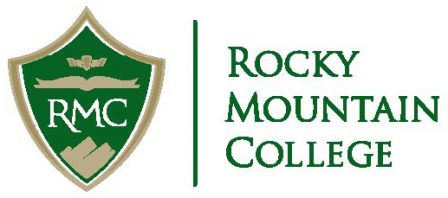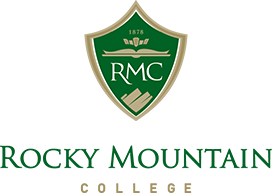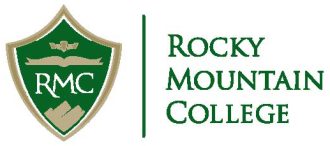Flight Instruction Labs
March 18, 2023 2024-03-22 21:10Flight Instruction Labs
Pilot Certification
Flight education is conducted under Federal Aviation Regulation Part 141 certification. Classroom instruction is conducted on campus, and flight instruction is conducted at Flight Operations at nearby Billings Logan International Airport. Students majoring in aeronautical science may receive credit for prior learning for the private pilot certificate and the instrument rating completed prior to enrollment. Credit for other FAA certification is reviewed and determined on a case-by-case basis. A student who completed private pilot training before coming to RMC will not be required to repeat private pilot flight training, though the student will fly a small number of extra flights in the instrument syllabus to learn local area procedures and the aircraft flown at RMC. That student must also take a challenge exam to ensure private pilot knowledge is strong. Once students enroll in the aviation program, all subsequent flight instruction must be received through the Rocky Mountain College Aviation Program.
Ground school instruction is conducted at the Rocky Mountain College campus, and flight instruction is conducted at Flight Operations at nearby Billings Logan International Airport. The airport provides Class C airspace with full radar service and enhances flight training. Training aircraft consist of Piper Archers, Cessna 172, and Piper Seminole aircraft. All aircraft and simulators are equipped with the Garmin 430 Global Positioning System. We have both aircraft and simulators with glass cockpits, meaning computer screens for the pilot instrument displays, rather than traditional round dials.
Flight lab syllabi are approved by the FAA and are designed to maximize efficiency and minimize cost. A student should be able to obtain his or her commercial rating in 190 total flight hours, compared to a minimum of 250 hours at some flight schools. This results in significant savings to the student.
Scheduling
Flight training periods are scheduled much like any other academic class. Students will sign up for a flight training period each semester and be scheduled to fly three times a week, either Monday-Wednesday-Friday or Tuesday-Thursday-Saturday. The student must consider the schedule of the flight training periods when signing up for other classes or extra-curricular activities. Consistent flying is important for student progression, and it is important to ensure a smooth schedule for all airplanes, instructors, and students.
All aircraft and simulator scheduling is done via an internet-based scheduling program, so students have access to up-to-the-minute information from any computer or smartphone.
Summer and Holiday Flying
Students are also expected to fly over multiple summers while at Rocky in order to smoothly move through the flight training syllabi and to reduce the cost of training by improving flying continuity. Summer flying greatly reduces the demand on the aircraft during the academic year. Failure to fly in the summer could make graduating on time difficult.
During the summer, the long hours of the daylight, nearly perfect weather, and opportunities to take aircraft on long cross-country flights make for a great flight environment. Students can also take advantage of an open schedule during school breaks, such as Christmas and spring break.
Residence halls are available during breaks for students who are actively flying. The Director of Aviation will have information about a particular break.
Lab Fees
Lab fees are payable at the time of registration for each flight lab course. The cost of the flight instruction is considered part of the student's academic program of study and is eligible for financial aid and Veteran's Administration (GI Bill®) benefits.
Lab fees cover all flight instruction and aircraft rental, simulator instruction, and designated examiner fees for the FAA practical exams. The private pilot and instrument rating lab fees include additional hours above the syllabus minimum requirements based on hours required for the average student to complete his or her flight training. Because of our unique FAA-approved syllabus, these hours count toward the commercial rating, resulting in significant savings.
The labs required for an aeronautical science major to graduate are:
- Private Pilot Flight Lab - AVS 153,
- Instrument Flight Lab - AVS 253,
- Commercial Flight Labs 1,2, & 3 - AVS 272, 273, & 274,
- Multi-Engine Flight Lab - AVS 376, and
- Crew Resource Management - AVS 404
RMC is approved for Veteran’s Administration GI Bill™ education benefits. These benefits cannot be applied towards flight lab costs.
| Available Lab Name / Number | Rate | Credits |
|---|---|---|
| AVS 170: Flight Orientation (aviation management majors) | $100 | 1 |
| AVS 153: Private Pilot Flight Lab | $18,100 | 2 |
| AVS 253: Instrument Flight Lab | $14,100 | 2 |
| AVS 272: Commercial Lab I | $7,300 | 1 |
| AVS 273: Commercial Lab II | $7,300 | 1 |
| AVS 274: Commercial Lab III | $7,500 | 1 |
| AVS 371: Cert. Flight Instructor | $5,500 | 2 |
| AVS 372: CFI Instrument | $2,500 | 1 |
| AVS 373: Multi-Engine Instructor | $4,500 | 1 |
| AVS 376: Multi-Engine | $7,100 | 1 |
| AVS 404: Crew Resource Management (conducted in simulator) | $650 | 2 |
The cost of flight training is in addition to normal college tuition and fees. The fee for each flight laboratory course is payable at the time of registration for the course. Flight lab completion may carry over from one semester to another. See section in the RMC catalog on Tuition and Fees for more information. Students have some expenses associated with flying that must be paid out-of-pocket, to include but not limited to a flight physical, mini iPad, Foreflight software, FAA written exam fees, headset, etc. All fees listed in the table above may be paid for from the student flight account.
If you are comparing costs of our aircraft with other schools, be sure you look at the per hour cost. Our private pilot syllabus, for example, is based on 50 flight hours. Students will fly more or less depending on their proficiency. Also, be sure to compare quality of the aircraft and whether or not a commercial rating can be achieved in 190 total flight hours.
Rocky Mountain College is approved by the FAA for Examining Authority, meaning check rides to complete a particular certificate (Private, Instrument, etc.) can be done by an employee at RMC Flight Operation. Students will not have to pay an FAA examiner for check rides, resulting in significant savings.
| Per Hour Rates | |
|---|---|
| Piper Archer III (Basic aircraft, including glass) | $170 |
| Piper Seminole (multi-engine aircraft) | $330 |
| Flight Training Devices (Redbird, motion simulator; Frasca Raptor, round dial; Frasca Mentor, glass cockpit) | $60 |
| Flight / ground instruction | $60 |
| End-of-course fee | $250 |
Contact
Aviation Hall
2821 Augusta Lane
Billings, MT 59102



